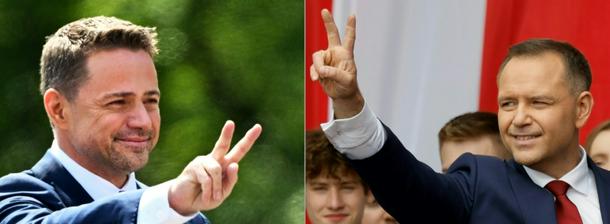
Opinion polls are predicting a close race in Poland's presidential vote on Sunday
Warsaw (AFP) - Warsaw’s pro-EU mayor and a nationalist historian held their last day of campaigning on Friday for Poland’s presidency, with opinion polls predicting a close race in Sunday’s vote, which will determine the direction of the key central European EU and NATO member.
Centrist Warsaw Mayor Rafal Trzaskowski, 53, faces off against right-leaning Karol Nawrocki, 42, in a runoff vote some analysts have described as a “clash of civilisations”.
Opinion polls predict a close race, with 50.6 percent of the vote going to Trzaskowski and 49.4 percent to Nawrocki, a tiny difference within the margin of error.
A victory for Trzaskowski would be a major boost for Poland’s government, which has been in a political deadlock with the current president.
It could also mean significant changes such as the introduction of civil partnerships for same-sex couples and an easing of Poland’s near-total ban on abortion.
A win for Nawrocki, backed by the right-wing Law and Justice Party, could undermine Poland’s steadfast support for neighbouring Ukraine against Russia.
Nawrocki, an admirer of US President Donald Trump, opposes NATO membership for Kyiv and has called for curbs on benefits for the estimated one million Ukrainian refugees in Poland.
Analysts say a Nawrocki victory could also lead to fresh parliamentary elections in the country of 38 million people, which has been one of Europe’s best economic performers.
Given the narrow polling margins, the result of the election may not be known until Monday.
“I would be cautious about popping the champagne on Sunday evening,” said Anna Materska-Sosnowska, a political expert.
- Counting on turnout -
Trzaskowski urged full mobilisation among his supporters, recalling the record turnout of over 74 percent that brought the centrists to power.
“If participation is as high as in 2023… we will win,” Trzaskowski said Friday in the northern town of Chojnice.
Nawrocki used his last campaign hours to leave flowers at a monument to Poles killed by Ukrainian nationalists during World War II.
“It was a genocide against the Polish people,” he said.
Poland, a staunch Ukraine ally since Russia’s invasion, wants Kyiv to admit responsibility for the Volyn massacres that killed around 100,000 Poles between 1943 and 1945.
Nawrocki supporter Lukasz, a 32-year-old businessman, said he was against welcoming migrants into Poland.
“I don’t want them here. I believe Karol Nawrocki can ensure that,” he told AFP at a rally in the eastern city of Biala Podlaska.
Pensioner Elzbieta Poniatowska, 63, said Nawrocki shared her values: “I’m a patriotic person, I love my country, I love God.”
- Two Polands -
Trzaskowski supporters at a rally in the port city of Gdansk held up a banner that said: “Your vote will decide which Poland you will live in.”
“We want to live in Europe and in an open society, where there’s room for everyone,” said Malgorzata Wojciechowska, a teacher in her fifties.
She said she hoped Trzaskowski would jumpstart a new discussion on easing the abortion laws.
Pensioner Zbigniew Zdaniewski, 75, said he supported Trzaskowski because “he is an honest person”.
He called Nawrocki a “pimp”, after a bombshell news report alleged the candidate had arranged prostitutes for guests while working as a hotel security guard.
Nawrocki called the accusations “a bunch of lies” and said he would sue the news site behind the report.
The election’s final result is expected to hinge on whether Trzaskowski can mobilise enough supporters and whether far-right voters will cast their ballots for Nawrocki.
Far-right candidates got more than 21 percent of the vote in the election’s first round, which Trzaskowski won by a razor-thin margin of 31 percent against 30 percent for Nawrocki.
Materska-Sosnowska called the election “a real clash of civilisations”, pointing to major policy differences between the candidates on issues including abortion or LGBTQ rights.
The job of Polish president is sometimes dismissed as a ceremonial post but it comes with crucial veto power over legislation.
That has often stymied Prime Minister Donald Tusk, a former European Council chief whose centrist Civic Coalition (KO) has clashed on multiple fronts with conservative President Andrzej Duda.